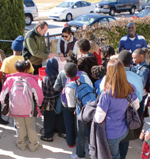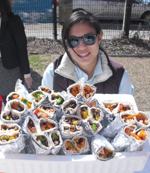|
|

|
Fresh Food Fridays promotes healthy eating
|
by Elizabeth Fulmer
College of Dental Medicine
More than 200 vegetable wraps were snatched up by students at Julian
Mitchell Elementary School Feb. 19 as part of MUSC’s Fresh Food Friday.
The event was part of a project of this year’s Presidential Scholars
Program. Presidential Scholars explore complex social, political, and
human issues of broad interest to health care professionals and
involves faculty representatives and students from all colleges at
MUSC. The Scholars Program theme for the year is “Healthcare Reform:
Policy, Communication, and Ethics.”
 Anatomy professor Dr. Thierry Bacro and Monique Huynh pass out wraps to Mitchell Elementary students Feb. 19. Anatomy professor Dr. Thierry Bacro and Monique Huynh pass out wraps to Mitchell Elementary students Feb. 19.
Four interprofessional groups are focusing on one of the overarching
goals for Healthy People 2020. The group I am participating in consists
of three faculty members: Thierry Bacro, Ph.D. (physical therapist),
Holly Wise, Ph.D. (physical therapist), and Nancy Zisk, J.D., of the
Charleston School of Law. There also are 10 students from MUSC
colleges: Monique Huynh (Health Professions), Sydney Cummings
(Medicine), Mason Hicks (Health Professions), Rosanna Robertson
(Graduate Studies), Katie Stroud (Dental Medicine), Alfred Griffin
(Dental Medicine), Adam Sieg (Pharmacy), Heather Leisy (Medicine),
J’Vonne Hunter (Nursing), and Trey Reeves (Pharmacy).
Our theme is eliminating preventable disease, disability, injury, and
premature death. To combat childhood obesity and future diseases
associated with obesity, we organized Fresh Food Fridays at a
Charleston elementary school to demonstrate a delicious, easy meal that
incorporates seasonal fresh vegetables.
The first event was held as soon as children got out of school. We
decided on a vegetable wrap that was full of healthy seasonal produce,
including peppers, beans, carrots, tomatoes, and broccoli. Zisk
and Wise prepared the wraps. Within 20 minutes, all 200 wraps were
completely gone. The group handed out 110 recipes for the dish,
including suggestions of how to tailor the recipe in different ways,
such as making it into a soup and including other vegetables and lean
meat.
 College of Health Professions student Monique Huynh show the wraps that were prepared for Mitchell Elementary students. College of Health Professions student Monique Huynh show the wraps that were prepared for Mitchell Elementary students.
Fresh Food Friday appeared to be a success. One 9-year-old exclaimed,
“I think they look good!” A mother of two children said, “We love our
vegetables,” but another said, “What? No meat in them?” Of
course, there were children throwing out the vegetable filling in the
wrap and eating the tortilla, but the group is optimistic that children
will eat more vegetables if they are given more opportunities.
Childhood obesity is a problem in today’s society, including in the
Charleston County population. Obesity is associated with a multitude of
diseases, including diabetes, coronary artery disease, and
hypertension. The group sought to not only educate children and their
caregivers on the importance of eating healthy, but also to give them a
hands-on, visual experience to see and taste how healthy, fresh
vegetables can be a part of their diets.
The group identified numerous barriers families may encounter that
prevent them from eating fresh fruits and vegetables on a regular
basis. Access to fresh produce is a problem for some downtown
residents. Those who do not have use of an automobile to get to the few
grocery stores near them are more likely to purchase convenient,
pre-packaged, ready-to-eat items. Our plan is to contact local farmers’
markets and grocery stores to set up an on-site market at a school for
parents, grandparents, and caregivers to have an opportunity to
purchase produce on their daily routes.
Perhaps caregivers may not be familiar with cooking methods for
seasonal produce. We sought to provide cooking demonstrations and
recipe cards to hand out to help families become more familiar with
healthy cooking methods. Because it was recognized that many students
eat two of their three daily meals at school, the program aimed for our
featured meal to be added to a school’s rotating lunch menu.
Walter Campbell, director of Nutrition and Food Services Department at
Charleston County School District, served as a community liaison. He
encouraged us to contact Julian Mitchell Elementary School in downtown
Charleston as a site for the project because of its student population
that relies on reduced-priced lunches, and its principal, Dirk Bedford,
who is open to health education programs. Bedford was very welcoming to
the group's proposed plan. Scotty Buff, M.D., director of the Junior
Doctors of Health and former Presidential Scholar, was contacted for
suggestions and improvements on the group's proposed plan.
Presidential Scholars would like to have another similar event to
gather data to evaluate the success of the project. The group plans to
evaluate students’ and families’ interest in incorporating more
vegetables into their diets, as well as explore other appetizing ways
of cooking vegetables that children will eat. Several students were
unable to persuade local farmer’s markets and other vendors to sell
their produce at the school, but they will continue to look into such
possibilities. The group is optimistic that one of its featured
meals will be on a future rotating lunch menu for Julian Mitchell
Elementary or possibly the Charleston County School District.
Friday, March 26, 2010
|
|
|




